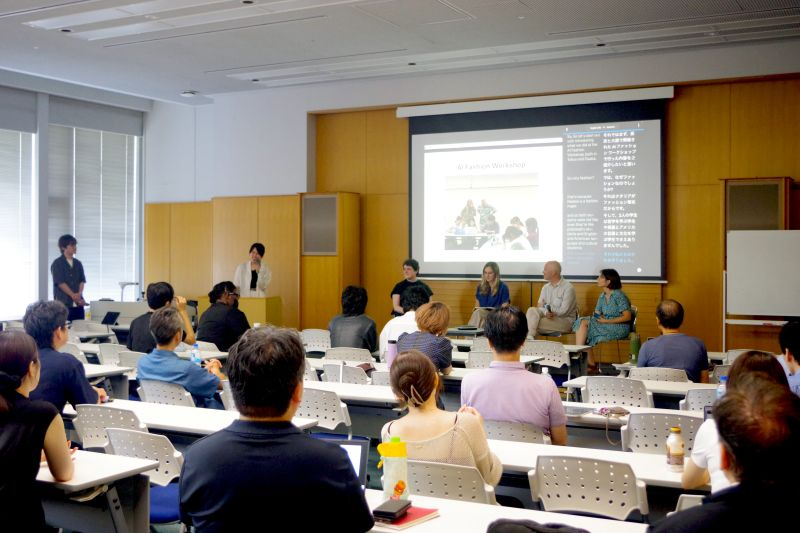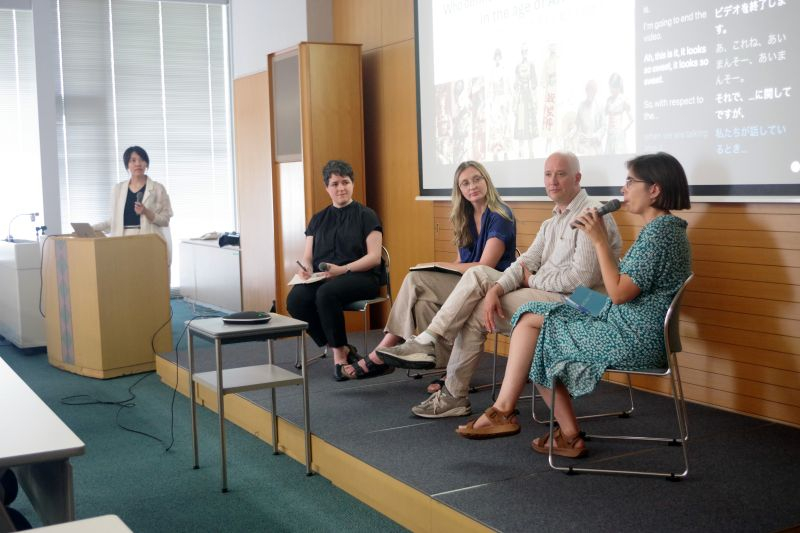OMU News
Jul 17, 2025
- Literature and Human Sciences
Friend or Foe? Associate Professor Jean Lin holds international symposium on AI and art
On Saturday, July 5, Associate Professor Jean Lin hosted the international symposium, “RESPECT: AI Creativity, Aesthetics and Ethics”, on Sugimoto Campus. The event, part of the collaborative research project “Evaluation of Aesthetics and Art in AI-Generated Works,” supported by OMU’s RESPECT Collaborative Research Grant, brought together an interdisciplinary array of expert panelists on the state of AI in art and culture.
Associate Professor Lin opened the event to an eager crowd of 40 participants, giving an overview of the day’s agenda, the series of workshops held prior, and the symposium’s sub-theme, “How Can AI Transcend the Boundaries of Culture?”. In the spirit of AI, Lin briefly discussed the AI-powered live translation experiment that was actively being tested during the event to overcome the language barrier and to see how well it did. Four presentations by expert panelists followed, addressing the symposium’s theme.
Natalia Särmäkari, a senior lecturer from the Fashion and Clothing Master’s Program at Metropolia University of Applied Science in Helsinki, discussed the topic of AI and Fashion Design. She touched on the positives and negatives of AI’s involvement in the fashion industry and advised what should be done moving forward. AI can provide a source of inspiration for designers, help with complex tasks, reimagine garment structures, and implement sustainable zero-waste patterns into fashion. However, Särmäkari cautioned that AI’s rapid expansion into the industry threatens designers and the design process, can reinforce bias, infringe on copyrights, and may cause increased waste in an industry already struggling with the aftermath of fast fashion.
Kalle Kataila, a media expert from Finland’s Aalto University further moved the discussion with the presentation, “From Camera to Code: AI Images & Post-Photography.” Kataila focused on AI’s role in generative photography or “post-photography,” where images are not taken, but created and manipulated. This challenges authenticity and the truth as AI never engages in the labor of photography, only imagines or “hallucinates.” Kataila expressed that such imagery lacks real authorship but makes humans rethink beyond the boundaries of conventional imagery.
Assistant Professor Amelia Katirai from the University of Tsukuba’s Institute of Humanities and Social Sciences touched on the topic of “Social and Environmental Issues of Generative AI Art.” Assistant Professor Katirai revealed AI’s ethical issues with its plagiarism of intellectual property and strain on the environment as its use of water, electricity, and rare mineral resources balloons to unsustainable levels.
Associate Professor Noa Garcia from the Institute for Advanced Co-Creation Studies and D3 Center at the University of Osaka further addressed the symposium’s theme from a computer science perspective. In her presentation, “AI Imagery and Stereotypes,” she explained how AI is trained on data; data which often holds an overwhelmingly narrow view from western English-based media and historical discrimination.
In the last half of the symposium, the panelists gathered to discuss topic points posed by Associate Professor Lin and questions from the audience. When speaking on AI and cultural appropriation, the panelists’ overall view was that AI intensifies stereotyping and further negatively affects marginalized groups. The problem further grows as AI is less accessible to certain groups to share their views, further skewing the dataset.
As AI builds momentum and becomes further entrenched in our lives, conversations such as these will be continuously necessary to make sense of the ever-growing blurred line between humans and AI.

Associate Professor Jean Lin introducing the symposium

Panelists discussing topic points
Contact
Global Strategy Division
Email:gr-glo-strategy[at]omu.ac.jp
*Please change [at] to @.
SDGs

